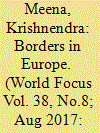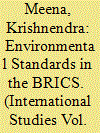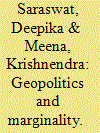| Srl | Item |
| 1 |
ID:
154066


|
|
|
|
|
| Summary/Abstract |
Since World War II, Europe has seen dramatic transformation of its borders. It has covered the full circle from the hard notions of territorial sovereignty enshrined in the Treaty of Westphalia to the Schengen Agreement wherein Europe allows free movement of goods, services, people and capital within the European Economic Area. The article looks at the changing borders in the European Union and their impact on the immediate neighbourhood of Europe.
|
|
|
|
|
|
|
|
|
|
|
|
|
|
|
|
| 2 |
ID:
180286


|
|
|
|
|
| Summary/Abstract |
Since its inception, the BRICS has received attention as a geopolitical challenger to the already established institutions of the Global North. BRICS members have also been vocal on issues concerning global environment. Brazil, India, China and South Africa have raised important issues at international conferences on Climate Change. The article looks at the specific issue of vehicular pollution in the BRICS countries. Vehicular pollution standards already in existence through the United Nations Environment Programme and the most cited and practised standards of the European Union remain the yardstick to be followed around the world. The article looks at the standards set up by the individual BRICS countries. Subsequently efforts of the BRICS as a group are explored through their joint statements. The article argues that despite important players in global vehicle market, the BRICS as a grouping has not been able to formulate any viable alternative standards for vehicular emissions.
|
|
|
|
|
|
|
|
|
|
|
|
|
|
|
|
| 3 |
ID:
151207


|
|
|
|
|
| Summary/Abstract |
Theorisation in modern geopolitics is replete with instances where certain regions have been accorded a marginal status in various schemes of global political–geographical configurations. Geopolitical ideas propounded by Halford J. Mackinder, Nicholas Spykman and Saul B. Cohen are all evidence of geopolitical visualisation and ordering which advantage certain parts of the world by geo-graphing them as strategically important. This ordering disadvantages certain other areas as less important and, therefore, marginal in the context of international politics. The study here attempts to locate the ascription of marginality in modern geopolitics.
|
|
|
|
|
|
|
|
|
|
|
|
|
|
|
|
| 4 |
ID:
135945


|
|
|
| 5 |
ID:
135946


|
|
|
|
|
| Summary/Abstract |
The recent phase of globalization is underlined by a clear “geopolitical shift” in favour of the developing world which has facilitated a recent spate of regionalization. A prominent feature of this “geopolitical shift” in the world system, resulting from the globalization of the world space in the last two decades is the emergence of a few developing states as economic powerhouses (China, India and Brazil). The post-cold-war period has seen a continuation of the relative shift of global economic power to the Asia-Pacific region (the recent currency “crisis” notwithstanding) and it is estimated that by 2020 four of the world’s five largest economies will be located in the region.[①] This complicates the conceptual clarity about the world political system, which was a feature of the Western discourse, as these economies challenge the traditional dominance of the industrialized states and new geographies take shape. The traditional division of the world into various spheres on the basis of levels of development viz. core-periphery, first world, third world, etc., now stands considerably altered. The emergence of China as the second largest economy of the world in recent years has defied the traditional notions of civilization, culture and development. This has led to a re-imagination of the world system which partly is a post-Cold-War situation wherein the bipolarity is missed and there exists an indication of a general momentum towards a multi-polar situation with regional groupings of states playing an ever increasing role in world politics. Overall, it is clear that the combination of globalisation with the “collapse” of bipolarity has ensured that regionalism and regionalisation will become increasingly important in world politics.[②] New regional formations are imagined which defy the logic of geography and are increasingly legitimized through constant repetition by statesmen, media and academic institutions. From the perspective of geopolitics these developments are significant for a number of reasons. Attempts to actively create and institutionalise regional entities represent an important moment in the politicisation of otherwise arbitrary geographic space.[③] Indo-Pacific is an example which by its expanse negates the traditional conceptions of “region”. This regionalization exercise holds relevance for India because of the reported Chinese presence in the Indian Ocean Region in the form of assistance in the construction of a number of ports in the region. Moreover, India has perceived the Indian Ocean space as the area of primary importance to them since the British times when the British designated it as a British lake. This imagination continued in the Indian strategic establishment even after independence from the British rule in the year 1947. It is significant to note that the British imagination of the Indian Ocean held value and tremendous imprint of the British navy till the year 1971 when the British forces withdrew from the East of Suez Canal. The Indian establishment for long held the British vision in the Indian Ocean.
|
|
|
|
|
|
|
|
|
|
|
|
|
|
|
|